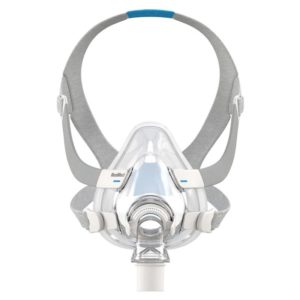Full Face Masks
ResMed AirFit™ F20 Full Face CPAP / BiPAP Mask with Headgear
Full Face CPAP Masks
The Nasal Pillows Style CPAP & BiPAP Mask offers comprehensive coverage for individuals requiring therapy for sleep apnea. Unlike nasal masks or nasal pillows, full face masks cover both the nose and mouth, providing a secure seal for airflow. There are various styles available, including those with silicone cushions that fit over the nose and mouth or hybrid designs that incorporate nasal pillows and a mouth covering. Full face masks are held in place with adjustable headgear that attaches to the mask at the forehead and sides of the face, ensuring stability throughout the night. The CPAP machine delivers pressurized air into the mask, which then circulates around both the nose and mouth, maintaining consistent therapy pressure. Ultimately, the choice of a Full Face CPAP Mask depends on individual comfort preferences, breathing patterns, and therapeutic needs. It's essential to consult with a healthcare provider or CPAP specialist to determine the most suitable mask style for optimal sleep therapy.
The Full Face CPAP Mask may be suitable for individuals who:
- Experience difficulty breathing through the nose due to congestion or allergies.
- Require higher prescribed pressure settings, typically above 10 or 12 cm H2O.
- Prefer a mask that allows for natural mouth breathing during sleep.
- Have a tendency to shift positions frequently during sleep, ensuring a secure seal throughout the night.
- Experience dry mouth or throat irritation with other mask styles, as full face masks provide coverage for both the nose and mouth.
However, Full Face CPAP Masks may not be suitable for individuals who:
- Experience claustrophobia or discomfort with masks covering the face.


